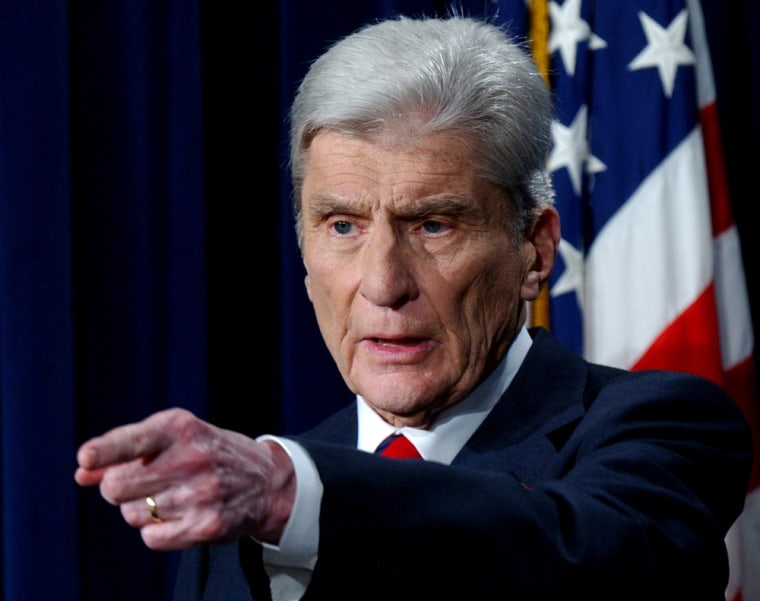Who’s the more astute student of Vietnam War history — President Bush or Sen. John Warner, R-Va.?
Warner, the octogenarian GOP Senate powerbroker who served as Navy secretary under President Nixon during the Vietnam War, called Thursday for Bush to begin withdrawing some U.S. troops from Iraq — he used the figure of 5,000 — so that they could be home by Christmas.
There are now more than 160,000 U.S. troops in Iraq.
Bush warned in his speech to the Veterans of Foreign Wars convention on Wednesday that an American exit from Iraq would have dire consequences, which he likened to the massacres and persecution that followed the U.S. exit from Indochina in 1974.
Warner rejected that analogy at his news briefing Thursday — yet he did so in a way that underscored the potentially catastrophic consequences of U.S. withdrawal.
“There are no parallels really," the Virginia Republican said. "It’s a different type of situation we were in … a country (Vietnam) that really did not pose a threat to the internal security of the United States as these conflicts in Iraq and Afghanistan do.”
For Warner, that’s exactly the dilemma: He wants a withdrawal of 5,000 by Christmas — but he implies that a failed state in Iraq would pose a menace to the United States.
Warner — just back from a trip to Iraq where he conferred with U.S. commanders and Iraqi politicians —specifically warned Thursday of “the ever-increasing threat from Iran.”
Yet Warner, the the most influential GOP senator on defense matters, made it clear that he wants Bush to begin withdrawal anyway — in the hope that the Iraqi government would be jolted into making the compromises necessary to achieve national reconciliation and an end to sectarian violence.
Warner said that if Bush were to announce a pullout of 5,000 or so troops it would be a “clear and decisive action to show that we mean business.” It would, he said, send “a sharp and clear message” that the Iraqi government could not rely on an open-ended commitment of U.S. forces.
Can Iraqis provide security? He stressed that he was not calling for total withdrawal of American forces, but the logic of his position pointed in only one direction: a series of gradual withdrawals of U.S. troops that would eventually lead to few or none being stationed in Iraq.
But as the National Intelligence Estimate (NIE) released by the intelligence agencies reported Thursday, whatever order and security there is in Iraq is being provided largely by U.S. troops and their British and other allies.
The Iraqi Security Forces "have not improved enough to conduct major operations independent of the Coalition on a sustained basis in multiple locations," the NIE said. The Iraqi Security Forces "remain reliant on the Coalition for important aspects of logistics and combat support."
When a reporter Warner Thursday asked if Congress should force Bush’s hand if the president chooses not to act, he seemed to wince in pain and alluded to his service as Navy secretary in the Nixon administration, when Congress cut off funding for the Indochina war.
“Having served in the Pentagon for five years during Vietnam and witnessed what the Congress did, I do not want to see a repeat of that,” he said.
But he implied the only way for Bush to avoid having Congress cut off funds was to take the initiative himself by ordering withdrawal to start.
Warner called his proposal for getting some troops home by Christmas “a recommendation” and added, “I’m not putting this thing out as a threat,” by which he meant he wasn’t committing himself to vote for a deadline for withdrawal or a cutoff of funds.
No promise on next step
He was guarded about what he might do if Bush chose to reject his advice. “I’m not in any way saying what my next step would be,” Warner told reporters.
He also did not address the question of what he would do if the Maliki government in Iraq or a successor regime is unwilling or unable to stop the slide toward a failed state.
Elected in 1978, Warner is serving his fifth term in the Senate. Iraq would be a burden for him if he chose to run again next year.
The consensus view among observers in Washington is that he will not run, but his words could be influential guidance for the rhetoric of beleaguered GOP senators, such as Norm Coleman of Minnesota and John Sununu of New Hampshire, who face re-election next year.
GOP operatives in Washington assume that Bush will withdraw at least some troops by next spring and hope that Iraq will not be the crippling issue for Republicans that it was in the 2006 elections.
